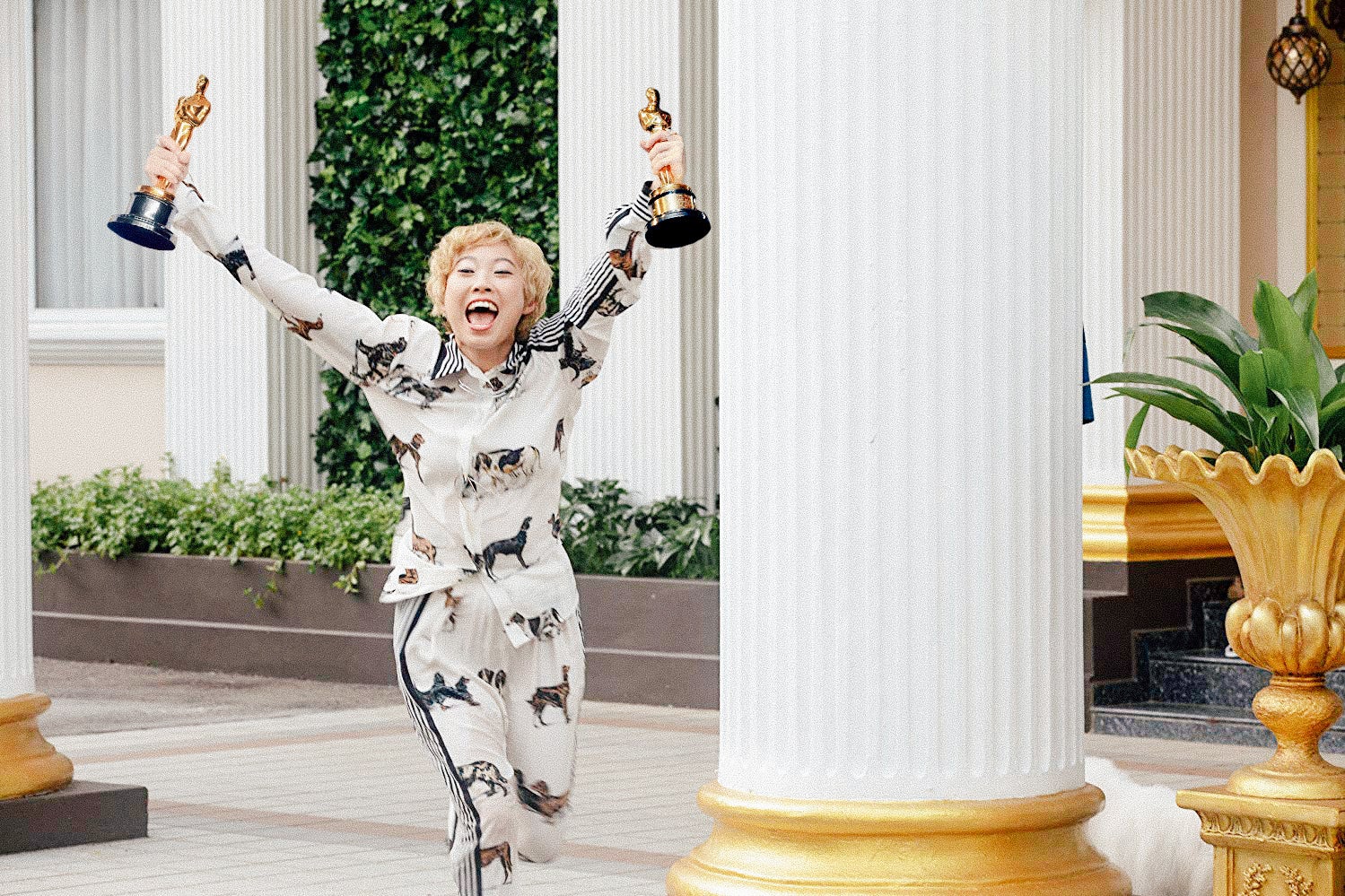Crazy Rich Asians has already made history twice. First, just by being made, it became the first studio-backed movie about Asian Americans in a quarter-century. Then, after it was released, it became the highest-grossing romantic comedy in more than a decade. Now it has the chance to make history a third time, by becoming the rare rom-com nominated for Best Picture and, I believe, the first movie about Asian Americans ever nominated for Best Picture.
Don’t believe me? You’re not alone. Oscar pundits seem to have been slow to recognize Crazy Rich Asians as a bona fide Oscar contender, perhaps because they haven’t viewed it as “Oscar-y” enough. But this winter, both the Screen Actors Guild and the Producers Guild of America gave the rom-com their own equivalent of a Best Picture nomination. While these awards shows might not be as well-known as, say, the Golden Globes (which also nominated the movie for Best Motion Picture—Musical or Comedy), the memberships of the SAG and PGA overlap significantly with that of the Academy of Motion Picture Arts and Sciences, i.e., the people who vote for the Oscars, and actors make up the largest branch of the academy. Not coincidentally, the SAG and PGA awards are two of the best indicators of a film’s Oscar chances. All of which is to say it appears that Crazy Rich Asians has a solid shot at scoring a nomination for Hollywood’s ultimate prize whether you think it should or not.
But should it? Yes, obviously! The pitch for Crazy Rich Asians’ Best Picture nomination is, in some ways, wildly uncomplicated: It’s a fantastic film. Director Jon M. Chu and screenwriters Peter Chiarelli and Adele Lim helped create an unusually moving and gloriously sumptuous romantic comedy with extraordinary cultural resonance, even apart from the dearth of Asian American representation on-screen. (The proposal scene is romantic as hell, but in terms of emotional might, it’s got nothing on the mahjong showdown where Constance Wu’s Rachel stands up for the struggles and triumphs that she and her single mom have undergone as an Asian American immigrant family.) Crazy Rich Asians not only fits snugly within the rom-com canon—a genre that Hollywood has excelled at in certain decades but has recently handed over to Netflix—but expands that canon by including the kinds of people that the genre never seemed to notice, and with stakes it’s thus seldom considered.
A Best Picture nod for Crazy Rich Asians would be a marvelous tribute to Hollywood’s history and clout, as well as earned acclaim for a deserving crowd-pleaser. And if ratings are what some voters are interested in, a nomination for this blockbuster would likely do a lot more to help than another nod for, say, Vice or Green Book, two more traditional (and frankly less groundbreaking) awards contenders that haven’t found anywhere near the same audience at the box office.
Best Picture nominations tend to travel with their own entourage of fellow nods: for best actor/actress, director, screenplay, cinematography, and the like. Crazy Rich Asians hasn’t enjoyed too many nominations in more craft-oriented categories like these, but it’s hard to deny that it’s a film that runs on a great many cylinders. The film reminds us that supporting actress Michelle Yeoh is a powerhouse who should have been the subject of more awards-season chatter, and it launched three breakout stars: Wu, Awkwafina, and first-time actor(!) Henry Golding. It’s hard to think of another film this year where the music, costumes, and location scouting are so instantly recallable, and that’s not counting the production-design team’s twin triumphs: Araminta’s wedding and the nonstop food porn. Few other films last year delivered so much of the pure cinematic pleasure of escapism.
Only by the Academy’s traditionally stodgy and narrow standards of quality could a mess like Vice, a self-own like Green Book, or a cash-grab like Bohemian Rhapsody be considered more apt candidates for “Best” Picture than a heady yet sturdy construction like Crazy Rich Asians. The film is far from perfect: The Astrid subplot, featuring chemistry-free performances by Gemma Chan and Pierre Png, especially makes me cringe. But a Best Picture nod would help nudge the Academy away from the cliff of irrelevance that it had been teetering on for some years now. Nominating one of the most winsome and widely seen romantic comedies—a genre largely associated with women—would mark one small step forward. Nominating a landmark of racial representation would represent another. (Indeed, on that score, let’s also keep our fingers crossed for the equally sublime and meaningful Black Panther and Spider-Man: Into the Spider-Verse.) And Lord knows it could stand to take some steps. If nothing else, a Crazy Rich Asians nod would help make up for the fact that the one of the very few films centered on Asians ever nominated for Best Picture—1937’s The Good Earth—involved a whole lotta yellowface.
